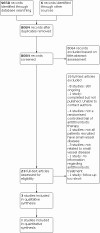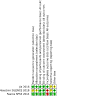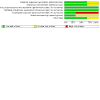Antithrombotic therapy to prevent cognitive decline in people with small vessel disease on neuroimaging but without dementia
- PMID: 35833913
- PMCID: PMC9281623
- DOI: 10.1002/14651858.CD012269.pub2
Antithrombotic therapy to prevent cognitive decline in people with small vessel disease on neuroimaging but without dementia
Abstract
Background: Cerebral small vessel disease is a progressive disease of the brain's deep perforating blood vessels. It is usually diagnosed based on lesions seen on brain imaging. Cerebral small vessel disease is a common cause of stroke but can also cause a progressive cognitive decline. As antithrombotic therapy is an established treatment for stroke prevention, we sought to determine whether antithrombotic therapy might also be effective in preventing cognitive decline in people with small vessel disease.
Objectives: To assess the effects of antithrombotic therapy for prevention of cognitive decline in people with small vessel disease on neuroimaging but without dementia.
Search methods: We searched ALOIS, the Cochrane Dementia and Cognitive Improvement Review Group's Specialised Register, and the Cochrane Stroke Group's Specialised Register; the most recent search was on 21 July 2021. We also searched MEDLINE, Embase, four other databases and two trials registries. We searched the reference lists of the articles retrieved from these searches. As trials with a stroke focus may include relevant subgroup data, we complemented these searches with a focussed search of all antithrombotic titles in the Cochrane Stroke Group database. SELECTION CRITERIA: We included randomised controlled trials (RCT) of people with neuroimaging evidence of at least mild cerebral small vessel disease (defined here as white matter hyperintensities, lacunes of presumed vascular origin and subcortical infarcts) but with no evidence of dementia. The trials had to compare antithrombotic therapy of minimum 24 weeks' duration to no antithrombotic therapy (either placebo or treatment as usual), or compare different antithrombotic treatment regimens. Antithrombotic therapy could include antiplatelet agents (as monotherapy or combination therapy), anticoagulants or a combination.
Data collection and analysis: Two review authors independently screened all the titles identified by the searches. We assessed full texts for eligibility for inclusion according to our prespecified selection criteria, extracted data to a proforma and assessed risk of bias using the Cochrane tool for RCTs. We evaluated the certainty of evidence using GRADE. Due to heterogeneity across included participants, interventions and outcomes of eligible trials, it was not possible to perform meta-analyses.
Main results: We included three RCTs (3384 participants). One study investigated the effect of antithrombotic therapy in participants not yet on antithrombotic therapy; two studies investigated the effect of additional antithrombotic therapy, one in a population already taking a single antithrombotic agent and one in a mixed population (participants on an antithrombotic drug and antithrombotic-naive participants). Intervention and follow-up durations varied from 24 weeks to four years. Jia 2016 was a placebo-controlled trial assessing 24 weeks of treatment with DL-3-n-butylphthalide (a compound with multimodal actions, including a putative antiplatelet effect) in 280 Chinese participants with vascular cognitive impairment caused by subcortical ischaemic small vessel disease, but without dementia. There was very low-certainty evidence for a small difference in cognitive test scores favouring treatment with DL-3-n-butylphthalide, as measured by the 12-item Alzheimer's Disease Assessment Scale-Cognitive subscale (adjusted mean difference -1.07, 95% confidence interval (CI) -2.02 to -0.12), but this difference may not be clinically relevant. There was also very low-certainty evidence for greater proportional improvement measured with the Clinician Interview-Based Impression of Change-Plus Caregiver Input (57% with DL-3-n-butylphthalide versus 42% with placebo; P = 0.01), but there was no difference in other measures of cognition (Mini-Mental State Examination and Clinical Dementia Rating) or function. There was no evidence of a difference in adverse events between treatment groups. The SILENCE RCT compared antithrombotic therapy (aspirin) and placebo during four years of treatment in 83 participants with 'silent brain infarcts' who were on no prior antithrombotic therapy. There was very low-certainty evidence for no difference between groups across various measures of cognition and function, rates of stroke or adverse events. The Secondary Prevention of Subcortical Stroke Study (SPS3) compared dual antiplatelet therapy (clopidogrel plus aspirin) to aspirin alone in 3020 participants with recent lacunar stroke. There was low-certainty evidence of no effect on cognitive outcomes as measured by the Cognitive Abilities Screening Instruments (CASI) assessed annually over five years. There was also low-certainty evidence of no difference in the annual incidence of mild cognitive decline between the two treatment groups (9.7% with dual antiplatelet therapy versus 9.9% with aspirin), or the annual stroke recurrence rate (2.5% with dual antiplatelet therapy versus 2.7% with aspirin). Bleeding risk may be higher with dual antiplatelet therapy (hazard ratio (HR) 2.15, 95% CI 1.49 to 3.11; low certainty evidence), but there may be no significant increase in intracerebral bleeding risk (HR 1.52, 95% CI 0.79 to 2.93; low-certainty evidence). None of the included trials assessed the incidence of new dementia.
Authors' conclusions: We found no convincing evidence to suggest any clinically relevant cognitive benefit of using antithrombotic therapy in addition to standard treatment in people with cerebral small vessel disease but without dementia, but there may be an increased bleeding risk with this approach. There was marked heterogeneity across the trials and the certainty of the evidence was generally poor.
Trial registration: ClinicalTrials.gov NCT00847860 NCT03061006 NCT01932203 NCT04698031 NCT03451591.
Copyright © 2022 The Cochrane Collaboration. Published by John Wiley & Sons, Ltd.
Conflict of interest statement
JK: none.
MH: none.
LC: none.
PM: none.
TQ: none.
LW: none.
Figures
Update of
- doi: 10.1002/14651858.CD012269
Similar articles
-
Multi-domain interventions for the prevention of dementia and cognitive decline.Cochrane Database Syst Rev. 2021 Nov 8;11(11):CD013572. doi: 10.1002/14651858.CD013572.pub2. Cochrane Database Syst Rev. 2021. PMID: 34748207 Free PMC article.
-
Cholinesterase inhibitors for vascular dementia and other vascular cognitive impairments: a network meta-analysis.Cochrane Database Syst Rev. 2021 Feb 22;2(2):CD013306. doi: 10.1002/14651858.CD013306.pub2. Cochrane Database Syst Rev. 2021. PMID: 33704781 Free PMC article.
-
Withdrawal or continuation of cholinesterase inhibitors or memantine or both, in people with dementia.Cochrane Database Syst Rev. 2021 Feb 3;2(2):CD009081. doi: 10.1002/14651858.CD009081.pub2. Cochrane Database Syst Rev. 2021. PMID: 35608903 Free PMC article.
-
Antiplatelet agents for preventing thrombosis after peripheral arterial bypass surgery.Cochrane Database Syst Rev. 2015 Feb 19;2015(2):CD000535. doi: 10.1002/14651858.CD000535.pub3. Cochrane Database Syst Rev. 2015. PMID: 25695213 Free PMC article.
-
Antihypertensive withdrawal for the prevention of cognitive decline.Cochrane Database Syst Rev. 2016 Nov 1;11(11):CD011971. doi: 10.1002/14651858.CD011971.pub2. Cochrane Database Syst Rev. 2016. PMID: 27802359 Free PMC article.
Cited by
-
Development and validation of a multimodal deep learning framework for vascular cognitive impairment diagnosis.iScience. 2024 Sep 13;27(10):110945. doi: 10.1016/j.isci.2024.110945. eCollection 2024 Oct 18. iScience. 2024. PMID: 39391736 Free PMC article.
-
Vascular cognitive impairment and dementia: a narrative review.Dement Neuropsychol. 2024 Sep 23;18:e20230116. doi: 10.1590/1980-5764-DN-2023-0116. eCollection 2024. Dement Neuropsychol. 2024. PMID: 39318380 Free PMC article. Review.
-
Antiplatelet therapy and incident cognitive impairment or dementia-a systematic review and meta-analysis of randomised clinical trials.Age Ageing. 2023 Oct 2;52(10):afad197. doi: 10.1093/ageing/afad197. Age Ageing. 2023. PMID: 37897809 Free PMC article.
-
Acupuncture is associated with reduced dementia risk in patients with insomnia: A propensity-score-matched cohort study of real-world data.J Tradit Complement Med. 2023 Feb 21;13(3):297-305. doi: 10.1016/j.jtcme.2023.02.003. eCollection 2023 May. J Tradit Complement Med. 2023. PMID: 37128194 Free PMC article.
-
Expanding the Neurological Phenotype of Anderson-Fabry Disease: Proof of Concept for an Extrapyramidal Neurodegenerative Pattern and Comparison with Monogenic Vascular Parkinsonism.Cells. 2024 Jun 29;13(13):1131. doi: 10.3390/cells13131131. Cells. 2024. PMID: 38994983 Free PMC article. Review.
References
References to studies included in this review
Jia 2016 {published data only}
-
- Jia J, Wei C, Liang J, Zhou A, Zuo X, Song H, et al. The effects of DL-3-n-butylphthalide in patients with vascular cognitive impairment without dementia caused by subcortical ischaemic small vessel disease: a multicentre, randomised, double-blind, placebo-controlled trial. Alzheimer's & Dementia: the Journal of the Alzheimer's Association 2016;12(2):89-99. [DOI: 10.1016/j.jalz.2015.04.010] [PMID: ] - DOI - PubMed
Maestrini SILENCE 2018 {published data only}
Pearce SPS3 2014 {published data only}
-
- Pearce LA, McClure LA, Anderson DC, Jacova C, Sharma M, Hart RG, et al. Effects of long-term blood pressure lowering and dual antiplatelet treatment on cognitive function in patients with recent lacunar stroke: a secondary analysis from the SPS3 randomised trial. Lancet Neurology 2014;13:1177-85. [CENTRAL: PMC4284947] [DOI: 10.1016/S1474-4422(14)70224-8] - DOI - PMC - PubMed
-
- Sharma M, Pearce LA, Benavente OR, Anderson DC, Connolly SJ, Palacio S, et al. Predictors of mortality in patients with lacunar stroke in the Secondary Prevention of Small Subcortical Strokes trial. Stroke; a Journal of Cerebral Circulation 2014;45(10):2989–94. [CENTRAL: PMC4175186] [DOI: ] [PMID: ] - PMC - PubMed
References to studies excluded from this review
ASPREE‐NEURO {published data only}ACTRN12613001313729
-
- Ward SA, Raniga P, Ferris NJ, Woods RL, Storey E, Bailey MJ, et al. ASPREE-NEURO study protocol: a randomized controlled trial to determine the effect of low-dose aspirin on cerebral microbleeds, white matter hyperintensities, cognition, and stroke in the healthy elderly. International Journal of Stroke 2017;12(1):108-13. - PMC - PubMed
AVERROES‐MRI assessment study {published data only}
COMPASS MRI {published data only}
-
- Sharma M, Hart RG, Smith EE, Bosch J, Eikelboom JW, Connolly SJ, et al. Rivaroxaban for prevention of covert brain infarcts and cognitive decline: the COMPASS MRI substudy. Stroke 2020;51:2901-9. - PubMed
Douiri 2013 {published data only}
Han 2013 {published data only}
-
- Han SW, Lee S, Kim SH, Lee JH, Kim GS, Kim O, et al. Effect of cilostazol in acute lacunar infarction based on pulsatility index of transcranial Doppler (ECLIPse): a multicenter, randomized, double-blind, placebo-controlled trial. European Neurology 2013;69:33-40. [DOI: DOI: 10.1159/000338247] - PubMed
Jacobs 2015 {published data only}
-
- Jacobs V, May HT, Bair TL, Anderson JL, Crandall BG, Cutler M, et al . Dementia and stroke rates were lower among patients receiving long-term anticoagulation therapy with novel oral anticoagulants compared to warfarin. American Journal of Cardiology 2015;118(2):210-4. [DOI: 10.1016/j.amjcard.2016.04.039] [PMID: 27236255] - DOI - PubMed
Kwok 2015 {published data only}
Kwon 2016 {published data only}
-
- Kwon HM, Lynn MJ, Turan TN, Derdeyn CP, Fiorella D, Lane BF, et al, Sammpris Investigators. Frequency, risk factors, and outcome of coexistent small vessel disease and intracranial arterial stenosis: results from the Stenting and Aggressive Medical Management for Preventing Recurrent Stroke in Intracranial Stenosis (SAMMPRIS) trial. JAMA Neurology 2016;73:36-42. [DOI: 10.1001/jamaneurol.2015.3145.] [PMID: ] - DOI - PMC - PubMed
LACI‐1 {published data only}
-
- Blair GW, Appleton JP, Flaherty K, Doubal F, Sprigg N, Dooley R, et al. Tolerability, safety and intermediary pharmacological effects of cilostazol and isosorbide mononitrate, alone and combined, in patients with lacunar ischaemic stroke: the LACunar Intervention-1 (LACI-1) trial, a randomised clinical trial. Lancet EClinical Medicine 2019;11:34-43. [DOI: ] - PMC - PubMed
Shinod‐Tagawa 2002 {published data only}
-
- Shindo-Tagawa T, Yamasaki Y, Yoshida S, Kajimoto Y, Tsujino T, Hakui N, et al. A phosphodiesterase inhibitor, cilostazol, prevents the onset of silent brain infarction in Japanese subjects with type II diabetes. Diabetologia 2002;45:188-94. - PubMed
Xu 2020 {published data only}
-
- Xu YY, Zong L, Zhang C, Pan Y, Jing J, Meng X, et al, on behalf of the CHANCE Investigators. The association of white matter hyperintensities with stroke outcomes and antiplatelet therapy in minor stroke patients. Annals of Translational Medicine 2020;8:331. [DOI: 10.21037/atm.2020.02.137] - DOI - PMC - PubMed
Zhang 2014 {published data only}
-
- Zhang Y, Zhang Z, Yang B, Li Y, Zhang Q, Qu Q, et al. Effects of antiplatelet agents on functional outcome and cognitive status in patients with acute ischaemic stroke. International Journal of Gerontology 2014;8(4):189-92. [DOI: 10.1016/j.ijge.2013.12.005] - DOI
References to studies awaiting assessment
CAVAD {published data only}
-
- NCT00847860. Cilostazol verse aspirin for vascular dementia in poststroke patients with white matter lesions (CAVAD). clinicaltrials.gov/ct2/show/NCT00847860 (first received 19 February 2009).
References to ongoing studies
CAF {published data only}
-
- NCT03061006. Impact of anticoagulation therapy on the cognitive decline and dementia in patients with non-valvular atrial fibrillation (CAF). clinicaltrials.gov/ct2/show/NCT03061006 (first received 23 February 2017).
CHALLENGE {published data only}
-
- NCT01932203. Efficacy study of cilostazol and aspirin on cerebral small vessel disease (Challenge). clinicaltrials.gov/ct2/show/NCT01932203 (first received 30 August 2013).
ChiCTR‐TCS‐14005054 {unpublished data only}
-
- ChiCTR-TCS-14005054. Cilostazol in retarding progression of cerebral white matter hyperintensities. www2.ccrb.cuhk.edu.hk/registry/public/269/history/1495 (first received 21 January 2014).
ECISBI {published data only}
-
- NCT04698031. Efficacy of Clopidogrel on Incidence of Silent Brain Infarction (ECISBI). clinicaltrials.gov/ct2/show/NCT04698031 (first received 6 January 2021).
LACI‐2 {published data only}
-
- NCT03451591. LACunar Intervention (LACI-2) Trial-2 (LACI-2). clinicaltrials.gov/ct2/show/NCT03451591 (first received 2 March 2018).
NCT01932203 {unpublished data only}
-
- NCT01932203. Efficacy study of cilostazol and aspirin on cerebral small vessel disease (Challenge). clinicaltrials.gov/ct2/show/NCT01932203 (first received 30 August 2013).
PICASSO‐Cog {published data only}
-
- Yu KH, Hong KS, Oh MS, Lee J, Lee JS, Kwon Su. Design and rationale for a cognitive outcome substudy in ischemic stroke patients with high risk of cerebral hemorrhage. Journal of Stroke and Cerebrovascular Diseases 2016;25(8):2061-6. [DOI: ] - PubMed
Additional references
Akinyemi 2013
-
- Akinyemi RO, Mukaetova-Ladinska EB, Attems J, Ihara M, Kalaria RN. Vascular risk factors and neurodegeneration in ageing related dementias: Alzheimer's disease and vascular dementia. Current Alzheimer Research 2013;10:642-53. - PubMed
Arba 2018
ATC 2002
Battle 2021
-
- Battle CE, Abdul-Rahimn AH, Shenkin SD, Hewitt J, Quinn TJ. Cholinesterase inhibitors for vascular dementia and other vascular cognitive impairments: a network meta-analysis. Cochrane Database of Systematic Reviews 2021, Issue 2. Art. No: CD013306. [DOI: 10.1002/14651858.CD013306.pub2] - DOI - PMC - PubMed
Beishuizen 2016
Blair 2019
-
- Blair GW, Appleton JP, Flaherty K, Doubal F, Sprigg N, Dooley R, et al. Tolerability, safety and intermediary pharmacological effects of cilostazol and isosorbide mononitrate, alone and combined, in patients with lacunar ischaemic stroke: the LACunar Intervention-1 (LACI-1) trial, a randomised clinical trial. EClinicalMedicine 2019;11:34-43. [DOI: 10.1016/j.eclinm.2019.04.001] - DOI - PMC - PubMed
Boutet 2016
Cameron 2014
-
- Cameron C, Coyle D, Richter T, Kelly S, Gauthier K, Steiner S, et al. Systematic review and network meta-analysis comparing antithrombotic agents for the prevention of stroke and major bleeding in patients with atrial fibrillation. British Medical Journal Open 2014;4:e004301. [DOI: 10.1136/bmjopen-2013-004301] - DOI - PMC - PubMed
Crum 1993
-
- Crum RM, Anthony JC, Bassett SS, Folstein MF. Population-based norms for the Mini-Mental State Examination by age and educational level. JAMA 1993;269:2386-91. [PMID: ] - PubMed
Del Brutto 2015
-
- Del Brutto OH, Mera RM, Zambrano M, Lama J, Del Brutto VJ, Castillo PR. Poor sleep quality and silent markers of cerebral small vessel disease: a population-based study in community-dwelling older adults (the Atahualpa Project). Sleep Medicine 2015;16:428-31. [DOI: 10.1016/j.sleep.2014.10.023] - DOI - PubMed
Diener 2008
-
- Diener HC, Sacco RL, Yusuf S, Cotton D, Ounpuu S, Lawton WA, et al. Effects of aspirin plus extended-release dipyridamole versus clopidogrel and telmisartan on disability and cognitive function after recurrent stroke in patients with ischaemic stroke in the Prevention Regimen for Effectively Avoiding Second Strokes (PRoFESS) trial: a double-blind, active and placebo-controlled study. Lancet Neurology 2008;7:875-84. [DOI: 10.1016/S1474-4422(08)70198-4] - DOI - PMC - PubMed
Fisher 1991
-
- Fisher CM. Lacunar infarcts – a review. Cerebrovascular Diseases 1991;1:311-20. [DOI: 10.1159/000108861] - DOI
Geeganage 2010
GRADEpro GDT [Computer program]
-
- GRADEpro GDT. Hamilton (ON): McMaster University (developed by Evidence Prime), accessed 1 December 2021. Available at gradepro.org.
Grammas 2011
Grau‐Olivares 2009
Higgins 2011
-
- Higgins JP, Green S, editor(s). Cochrane Handbook for Systematic Reviews of Interventions Version 5.1.0 (updated March 2011). The Cochrane Collaboration, 2011. Available from training.cochrane.org/handbook/archive/v5.1/.
Iadecola 2010
Ishida 2014
Jack 2010
Jordan 2020
Kwan 2016
-
- Kwan JS, Mak SF, Hui R, So K, Har WY, Azman R, et al. Prevalence and clinical impact of white matter hyperintensities, cerebral microbleeds, and medial temporal lobe atrophy on short- and long-term outcomes after stroke rehabilitation. Hong Kong Medical Journal 2016;22(Suppl 1):28. [hdl.handle.net/10722/225697]
Lip 2015
McNeil 2018
McShane 2019
Moffitt 2016
-
- Moffitt P, Lane DA, Park H, O'Connell J, Quinn TJ. Thromboprophylaxis in atrial fibrillation and association with cognitive decline: systematic review. Age Ageing 2016;45(6):767-75. [DOI: ] - PubMed
Mok 2015
Mortamais 2013
Norrving 2015
Peng 2019
Prince 2013
Richard 2012
-
- Richard E, Andrieu S, Solomon A, Mangialasche F, Ahtiluoto S, Moll van Charante EP, et al. Methodological challenges in designing dementia prevention trials – the European Dementia Prevention Initiative (EDPI). Journal of Neurological Sciences 2012;322(1):64-70. - PubMed
Safouris 2015
-
- Safouris A, Psaltopoulou T, Sergentanis TN, Boutati E, Kapaki E, Tsivgoulis G. Vascular risk factors and Alzheimer's disease pathogenesis: are conventional pharmacological approaches protective for cognitive decline progression? CNS & Neurological Disorders Drug Targets 2015;14:257-69. - PubMed
Schünemann 2008
Shinoda‐Tagawa 2002
Smith 2017
-
- Smith EE, Saposnik G, Biessels GJ, Doubal FN, Fornage M, Gorelick PB, et al, American Heart Association Stroke Council, Council on Cardiovascular Radiology and Intervention, Council on Functional Genomics and Translational Biology, and Council on Hypertension. Prevention of stroke in patients with silent cerebrovascular disease: a scientific statement for healthcare professionals from the American Heart Association/American Stroke Association. Stroke 2017;48(6):e44-e71. [DOI: ] - PubMed
Wardlaw 2013
-
- Wardlaw JM, Smith EE, Biessels GJ, Cordonnier C, Fazekas F, Frayne R, et al, STandards for ReportIng Vascular changes on nEuroimaging (STRIVE v1). Neuroimaging standards for research into small vessel disease and its contribution to ageing and neurodegeneration. Lancet Neurology 2013;12:822-38. [DOI: 10.1016/S1474-4422(13)70124-8] - DOI - PMC - PubMed
Wardlaw 2019
Wardlaw 2021
Wimo 2013
Wong 2020
World Alzheimer Report 2015
-
- Prince M, Wimo A, Guerchet M, Ali GC, Wu YT, Prina M. World Alzheimer Report 2015. London (UK): Alzheimer's Disease International (ADI), 2015.
References to other published versions of this review
Kwan 2016b
-
- Kwan JS, Myint PK, Wong A, Mok V, Lau GK, Mak KF. Antithrombotic therapy to prevent cognitive decline in people with small vessel disease on neuroimaging but without dementia. Cochrane Database of Systematic Reviews 2016, Issue 7. Art. No: CD012269. [DOI: 10.1002/14651858.CD012269] - DOI - PMC - PubMed
Publication types
MeSH terms
Substances
Associated data
LinkOut - more resources
Full Text Sources
Medical
Research Materials




